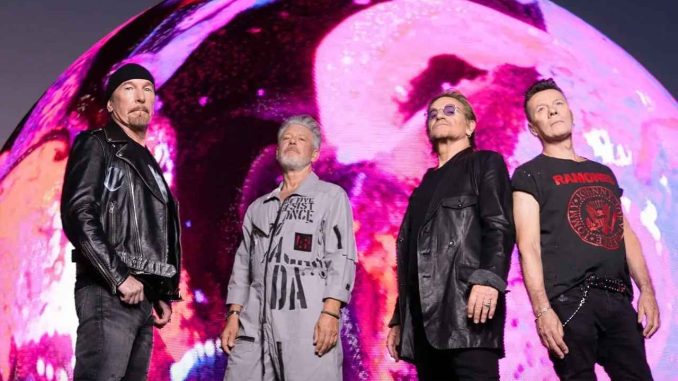
It’s a bright spring afternoon in Dublin, and somewhere behind the discreet gates of a converted recording space, four men are chasing something that doesn’t yet exist. A bassline loops in the background. The Edge, hunched over a guitar awash in delay, is sketching out melodies like he’s painting with sound.

Bono leans into the mic, half-singing, half-muttering fragments of lyrics. Larry Mullen Jr., back from surgery, locks in with Adam Clayton’s bassline until the groove feels like muscle memory.
This is U2, forty-plus years in, and they’re still chasing the thing they’ve always chased the perfect song.
“It’s About Playing Like Our Lives Depend On It”
“We’ve been in the same room, just jamming, playing until something clicks,” The Edge tells me, leaning forward like he’s letting me in on a secret. “That chemistry only happens live, together. You can’t manufacture it in a laptop.”
Adam Clayton nods. “Larry’s back and he’s better than ever. There’s an energy in the room we haven’t had in a long time. It’s pushing all of us harder.”
Bono chimes in, describing the work not in terms of nostalgia, but ambition:
“We had to deal with the past to get to the present. Now, we’re chasing the sound of the future. It’s not about looking back, it’s about what’s next.”
A Dream Team Behind The Desk
Helping them shape that “future” are two of their most trusted collaborators: producer Jacknife Lee, who gave Songs of Experience its polish and punch, and sonic architect Brian Eno, whose fingerprints are all over U2’s most daring work.
Eno has been nudging the band toward something Bono calls “science fiction Irish folk music”, a hybrid of traditional textures and forward-leaning electronics. “We’ve never been afraid to get lost in the process,” Bono says. “This time, we want to get lost and then find a way home that no one expects.”
Twenty-Five Ideas, One Cohesive Vision
On the wall of the control room, there’s a list of working song titles around 25 in total. Some are nearly finished; others are skeletal ideas waiting for the right spark. “We’ll narrow it down to maybe 10 or 15,” The Edge says. “It has to feel like a journey from start to finish.”
That attention to narrative flow is pure U2. They’ve always made albums as statements, not just playlists.
The Clock Is Ticking
There’s no official release date, but Adam Clayton hints the band wants the album out by 2026. “We’re not rushing it,” he says. “But there’s a fire under us. We know what’s at stake.”
Until then, they’ll keep refining, rewriting, and recording, chasing that elusive moment when all the pieces lock together and the hair on your arms stands up.
Why It Matters
For U2, this isn’t about proving they can still do it, it’s about proving they can still surprise themselves. The band that once asked “How to Dismantle an Atomic Bomb” is now trying to build one, musically speaking. And if the fragments I’ve heard are any indication, they might just pull it off.
If you listen closely, you can almost hear the future they’re talking about. It’s somewhere between The Edge’s echoing chords, Bono’s unfinished lines, Larry’s kick drum, and Adam’s steady pulse. It’s not here yet, but they’re getting closer with every take.
Leave a Reply